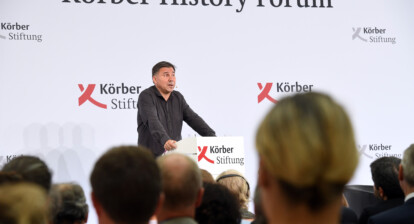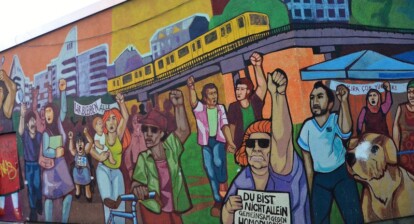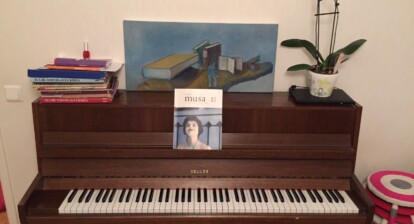Germany is not a religious state. It does not have a state religion or state church. The number of registered church members is declining year by year. But which role do the churches play in public discussions? What does being a practitioner of religion mean for a young German, and where to find interactions? Gregor shares his perspective on the triangular relationship between policy, churches and personal belief.
“They are just coming for asylum shopping!” “Migration is the mother of all political problems.” Statements like these are regularly heard even by German establishment politicians. Our discourse on migration, refugees and asylum sadly becomes tougher and tougher. What was formerly unspeakable became a regular part of it. This trend in Germany’s public worries me.
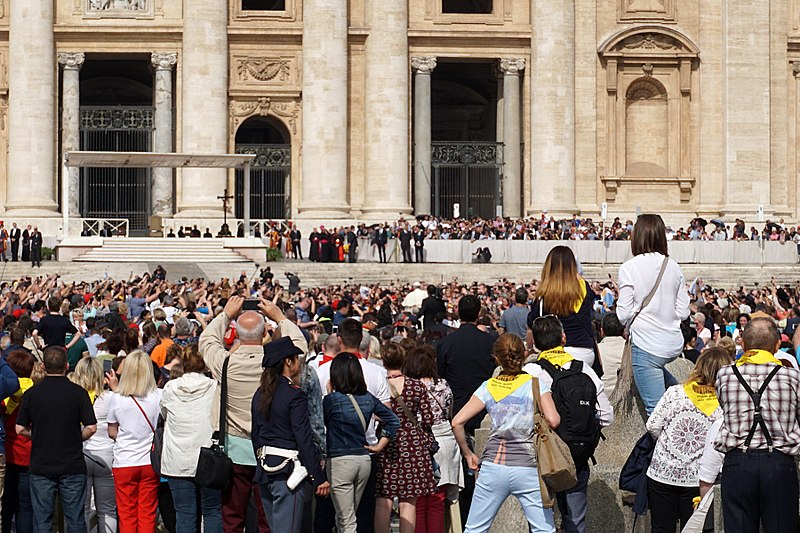
Faithful people from different contexts waiting for Pope Francis. (Photo: CC / Mario Roberto Durán Ortiz)
In times like these, it is important, that people and organisations raise their voice for humanity. A revived voice is the one of the churches, most prominently the catholic and protestant church – even though the number of official members of the churches reaches record low after record low and endorsements of political parties by church officials are part of the past. But currently – not only on migration – churches gain visibility beyond their own domains (classical: work-free Sundays). This visibility is not only about their social and charity work they do throughout their parishes and organisations such as Caritas or Diakonie, Malteser or Johanniter. They are taking a position for individuals, society, one could even state humanity. But why and to what extent does that matter for me as a believer?
I am a Believer
I am an active part of the catholic communities. As a catholic Christian, I need to share some of my general considerations, before reflecting on the policy-wise presence of my church:
Why do I believe? And in what? Two very difficult questions, but they go to the core of my identity and social communities. I will keep it short. Firstly, there is the Christian message(s): Do not only care about yourself but also about your neighbour. Take those into consideration which are less fortunate than you. There is forgiveness for almost every mistake, if you ask for it, and there will be something after the life on earth.
To me, these issues offer orientation (at least I hope and try so). They offer meaning and hope and something that I would call a ‘personal relationship to my God’. This, together with a personal, a local but also a worldwide community of other people sharing similar hopes and principles, is essential for me.
Being a Christian believer in these times is everything but easy. In Germany and in Europe this is usually not about persecution or even structural discrimination as others have to face. But there are different, more internally rooted questions, which I deal with on an almost daily basis:
Professing one’s Faith – a Problem?
Only few of my fellow Christians in my age openly and freely profess their believes, especially when being in a more secular or even religion-sceptical surrounding. This is usually referring to a critical approach towards the institution: “Aren’t they all involved in child abuse? I cannot believe in such a paternalistic organisation! What can a 2000-year-old religion tell me today, wasn’t that only for farmers?”
I frequently receive comments and questions like these ones when addressing my belonging to the Christian community. I do not ignore the first two types of statements even not believing in an organisation but in the above-mentioned message(s) together with a worldwide community. But questions of the third type make me vivid. Christianity has many ‘things to tell’ that go beyond spirituality and forgiveness. Those are to be brought in our political discussions. Let me give you an example:
Religion in Dialogue
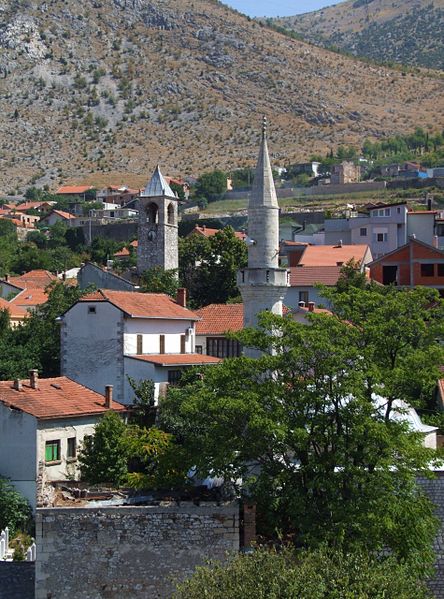
A mosque and a church next to each other in Bosnia. (Photo: CC / Marcin Szala)
A so-called Christian Occident, as referred to by many right-wing populists, to be protected from a “muslim invasion” does not exist. The tension between Islam and Christianity has – at least in Europe – found its official end after a difficult history: from crusades, the so-called Reconquista of the Iberic Peninsula, Ottoman dominance in the Balkans for centuries to a provoked, bloody conflict in the Western Balkans 1990s.
Today I am happy that Christian-Islamic dialogue is not only existent but openly promoted for example by the German Bishops’ Conference and its CIBEDO (Centre for Christian-Muslim Encounter and Documentation) already founded in the 1970s.
Institution and Belief
Besides professing and acting accordingly, there is a second problem approaching. It is important to me not to look away when it comes to my church as an institution. In Germany, but as well in other countries from Chile to Ireland and many others there is more than one issue with the question of hierarchies, power and power abuse. The most obvious expression of this is sexual(ised) abuse.
I am shocked, worried and feel helpless when hearing and reading about this. This church, my church, has structural problems. Serious ones that make it sometimes almost impossible to transmit its important to joyful key messages. One could wish a public absence of the church being ashamed of these happenings. But instead, I feel the need to be active myself in discussions and in its fora to initiate change regarding these incredible grievances. If I just pose this task to the cardinals, bishops and other responsible leaders, I would be sustaining the same structures which I believe to be reformed.
Becoming a more Political Church
This is the point, at which I would like to return to the policy arena and the question of migration and asylum from the articles’ beginning: Independently of structures, I like my church – lay believers as well as officials – to be active in the political sphere.
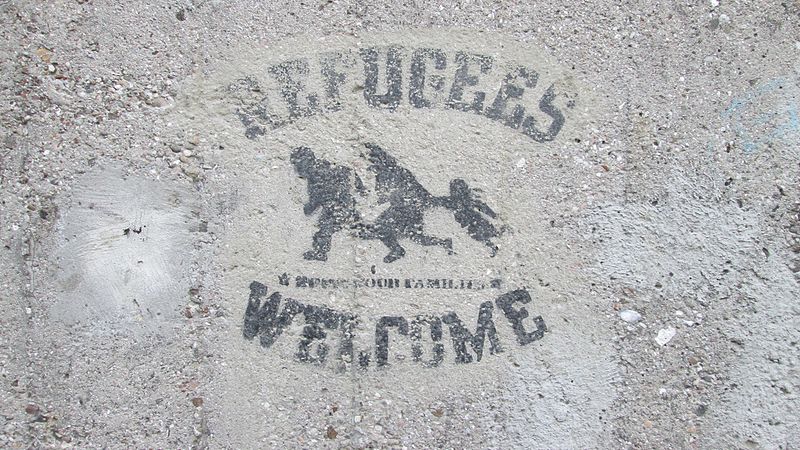
Church Asylum: Refugees are Welcome here! (Photo: CC / WalterW.A.)
The Church Asylum granted by catholic and protestant parishes is just one out of many opportunities to welcome, protect and integrate individuals regardless their personal belonging, history or belief. The Christian churches were always those which should be caring about the weakest in our societies – be it the old, the poor, the sick or the strangers. For humanity. That is what I believe in and want me, my fellows, and my church to stick to.
I like and support statements such as “referring to Rule of Law does not mean making law more restrictive”, “do not consider migrants firstly as workforce” or “do not distinguish sharply between ‘real’ asylum seekers and economic migrants”. These contributions by the church into current debates are heard – especially because they have become rare in the general discourse in my country.
A Church Shaping Debates
From this perspective, I really want my church to be a political one, one that can shape debates. Not for its own interest, as it sometimes did for example in the so-called Kulturkampf (engl. Cultural struggle) 1872 to 1886, but for its messages and principles, without imposing them as the only truth to decision makers. I guess that “my” Christianity has a word to say here, a serious contribution to make beyond parties, individuals and non-governmental organisations. The human- and dignity-centred principals of catholic social teaching focus on their own interpretation of principles like solidarity, subsidiarity and social justice. One can discuss these interpretations but all together they are arguing for societies which are orientated to the Common Good. This is a hard task, an inconvenient one!
Working for a Common Good
Churches have not been proving to do only good in the world: They have many problems themselves, but they are still an important force and political player. I do want my church, my communities to be active and political, to work for a Common Good higher than personal interests and benefit-risk assessments: We have a say in current advocacy for the preservation of creation (meaning environment protection in non-church language), the fight for a more social Germany, Europe and world or in promoting fair and respectful partnerships in a faster and faster globalisation.
This Common Good is not a “nice to have” thing. In my opinion it is what all Europeans, all humans regardless their personal faith can and should work on. This should not be imposed; not everyone has to share churches’ perspectives on these questions. What I wish anyways, is the mindset as a central question to be shared: Only together we can save our human Europe.

